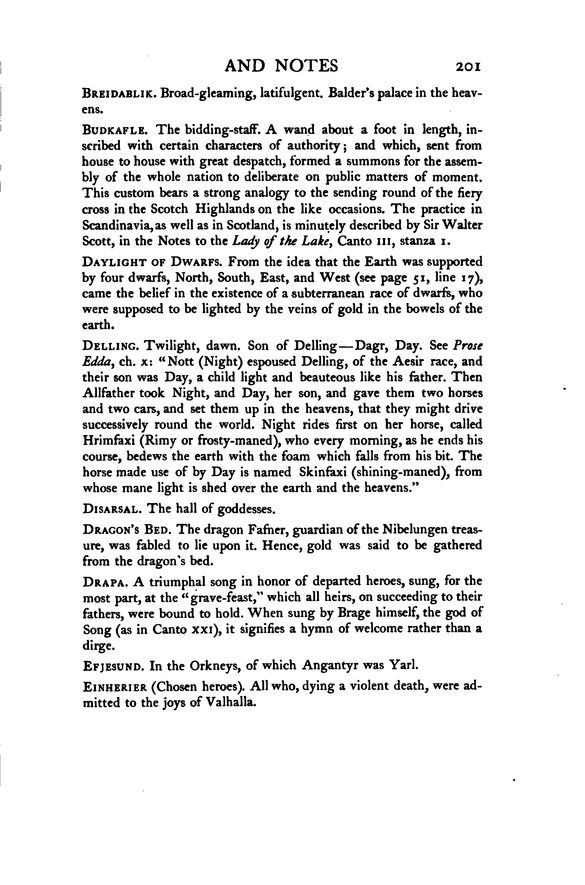
Full resolution (JPEG) - On this page / på denna sida - Alphabetic glossary and notes

<< prev. page << föreg. sida << >> nästa sida >> next page >>
Below is the raw OCR text
from the above scanned image.
Do you see an error? Proofread the page now!
Här nedan syns maskintolkade texten från faksimilbilden ovan.
Ser du något fel? Korrekturläs sidan nu!
This page has never been proofread. / Denna sida har aldrig korrekturlästs.
AND NOTES
201
Breidablik. Broad-gleaming, latifulgent. Balder’s palace in the
heavens.
Budkafle. The bidding-staff. A wand about a foot in length,
inscribed with certain characters of authority; and which, sent from
house to house with great despatch, formed a summons for the
assembly of the whole nation to deliberate on public matters of moment.
This custom bears a strong analogy to the sending round of the fiery
cross in the Scotch Highlands on the like occasions. The practice in
Scandinavia,as well as in Scotland, is minutely described by Sir Walter
Scott, in the Notes to the Lady of the Lake, Canto hi, stanza i.
Daylight of Dwarfs. From the idea that the Earth was supported
by four dwarfs, North, South, East, and West (see page 51, line 17),
came the belief in the existence of a subterranean race of dwarfs, who
were supposed to be lighted by the veins of gold in the bowels of the
earth.
Delling. Twilight, dawn. Son of Delling—Dagr, Day. See Prose
Edda, ch. x: "Nott (Night) espoused Delling, of the Aesir race, and
their son was Day, a child light and beauteous like his father. Then
Allfather took Night, and Day, her son, and gave them two horses
and two cars, and set them up in the heavens, that they might drive
successively round the world. Night rides first on her horse, called
Hrimfaxi (Rimy or frosty-maned), who every moming, as he ends his
course, bedews the earth with the foam which falls from his bit. The
horse made use of by Day is named Skinfaxi (shining-maned), from
whose mane light is shed over the earth and the heavens."
Disarsal. The hall of goddesses.
Dragon’s Bed. The dragon Fafher, guardian of the Nibelungen
treasure, was fabled to lie upon it. Hence, gold was said to be gathered
from the dragon’s bed.
Drapa. A triumphal song in honor of departed heroes, sung, for the
most part, at the "grave-feast," which all heirs, on succeeding to their
fathers, were bound to hold. When sung by Brage himself, the god of
Song (as in Canto xxi), it signifies a hymn of welcome rather than a
dirge.
Efjesund. In the Orkneys, of which Angantyr was Yarl.
Einherier (Chosen heroes). All who, dying a violent death, were
admitted to the joys of Valhalla.
<< prev. page << föreg. sida << >> nästa sida >> next page >>